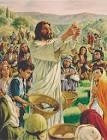
A boy is at the centre of the drama in today’s gospel. He offers his small portion of food to Andrew. Barley loaves were the food of the poor and the fish were probably small, like sardines. He probably did not come from a wealthy family and may have struggled with himelf before he gave what he had. His action captures exactly what eucharist means. It is a personal encounter between Jesus and the individual but its effects are to be shared to nourish others. Mary Magdalene in meeting Jesus in the garden must have wished to stay with him in that place forever but she was commanded to go and share her joy with the apostles.
The boy, in coming forward with his simple meal, showed a child’s trust that something could be done with it. In our lives we may feel we have very little to contribute; but if we present it in faith to Jesus, he can turn it into something very much greater. John links the story of the feeding of the five thousand with Jesus’ teaching on the eucharist in chapter six. He wanted to show that the food he would give, that of his own body and blood, is the living bread which nourishes and sustains forever. It would be a big leap of faith for the crowds, who saw him purely as a wonder worker who they wanted to make into their king.
The synoptic gospels locate the institution of the eucharist at the Last Supper. John, however, recounts how Jesus washed his disciples’ feet. This is how he wanted them to behave to one another as the fruit of his complete self-giving.